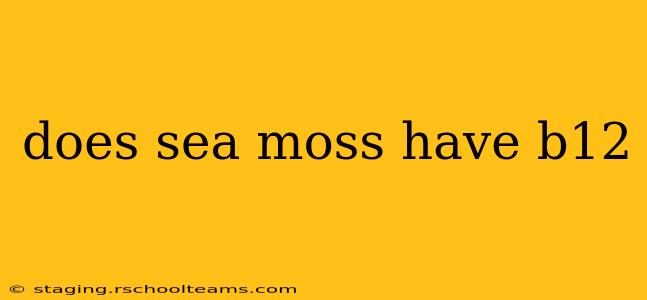Sea moss, a type of red seaweed, has gained popularity as a nutritional supplement, touted for its impressive vitamin and mineral profile. One frequently asked question revolves around its B12 content: Does sea moss have B12? The short answer is complex and requires a nuanced understanding. While sea moss does contain some B vitamins, the amount of B12 present is generally considered insufficient to meet daily requirements for most people. Let's delve deeper into this important topic.
How Much B12 is in Sea Moss?
The B12 content in sea moss is a subject of ongoing research and debate. While some studies suggest trace amounts are present, the quantity is often too low to be reliably considered a significant source. Many factors influence the actual B12 levels, including the specific species of sea moss, its growing conditions, and processing methods. Therefore, relying on sea moss as your sole source of vitamin B12 is strongly discouraged.
Why is B12 Important?
Before we dismiss sea moss as a B12 source entirely, let's understand the crucial role of vitamin B12 in our bodies. B12, also known as cobalamin, is essential for:
- Red blood cell formation: B12 helps create healthy red blood cells, preventing anemia.
- DNA synthesis: It plays a vital role in DNA replication and cell division.
- Nerve function: B12 is crucial for maintaining healthy nerve function and preventing neurological damage.
- Brain health: Studies link adequate B12 levels to improved cognitive function and reduced risk of dementia.
What are the Best Sources of B12?
Since sea moss isn't a reliable source, where should you get your B12? The best sources include:
- Animal products: Meat, poultry, fish, eggs, and dairy products are naturally rich in B12.
- Fortified foods: Many breakfast cereals, nutritional yeasts, and plant milks are fortified with B12 to cater to vegan and vegetarian diets.
- B12 supplements: For those who are deficient or struggle to obtain enough B12 from their diet, supplements are readily available. Always consult a healthcare professional before starting any new supplement regimen.
Is Sea Moss Still a Healthy Food?
Even though it may not be a significant source of B12, sea moss remains a nutritious food with other health benefits. It's a good source of:
- Minerals: Including iodine, potassium, magnesium, and iron.
- Fiber: Contributing to digestive health.
- Antioxidants: Helping protect cells from damage.
It's important to remember that a balanced diet is key. While sea moss can contribute to overall well-being, it shouldn't be viewed as a miracle cure or a replacement for other essential nutrients.
Can I Get Enough B12 from a Sea Moss Diet?
No, you cannot reliably get enough B12 from a sea moss-only diet. The levels are too inconsistent and too low to meet the daily recommended intake. This is crucial for individuals following vegan or vegetarian diets, who are already at higher risk of B12 deficiency. Always prioritize diverse and reliable sources of vitamin B12.
What are the Risks of B12 Deficiency?
B12 deficiency can lead to various health problems, including:
- Megaloblastic anemia: Characterized by large, immature red blood cells.
- Pernicious anemia: A specific type of anemia caused by the body's inability to absorb B12.
- Nerve damage: Leading to numbness, tingling, and weakness.
- Cognitive impairment: Including memory loss and confusion.
Conclusion
While sea moss offers several health benefits, it's crucial to understand its limitations regarding B12. While trace amounts may be present, it's not a dependable source to meet daily requirements. Prioritize a balanced diet rich in B12 from other sources, or consult with a healthcare professional about supplementation if necessary. Remember, sea moss is a valuable addition to a healthy diet, but not a replacement for essential nutrients like vitamin B12.
